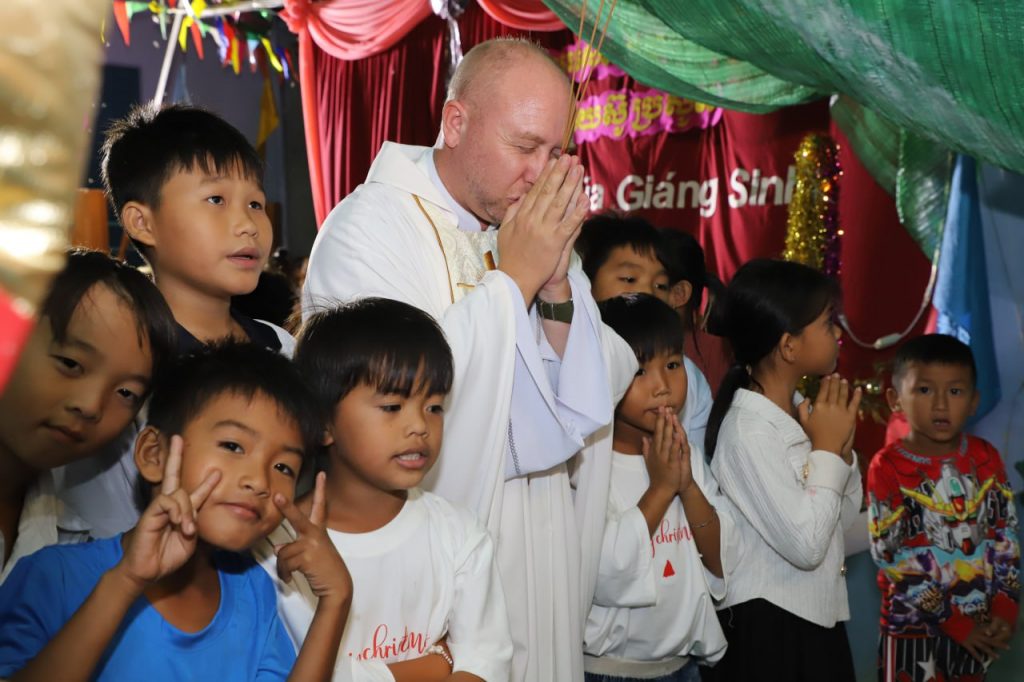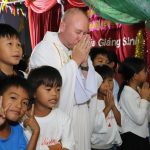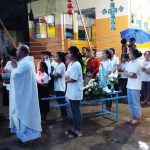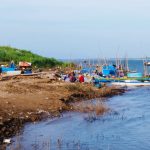
Six years ago, I was sent to Cambodia and today share my ministry between five Catholic communities, including the French Catholic community of Phnom Penh, and a Vietnamese community in the fishing village of Prekpor, located on the right bank of the Mekong, North East of Phnom Penh, about an hour from the capital. I go there by boat on two Sundays a month and every Friday. The rest of the time, I visit my other parishes by motorbike. This community is very unusual because it is organized around a single lane with, mainly, wooden houses and some hard infrastructure. Its members live on the banks of the river which seems, at first glance, to be their only horizon. This village is now home to around fifty families. All the residents live in this same lane. All are Vietnamese. There are thirty-five Catholic and twelve Buddhist families, the others professing no religion. All the men are fishermen from the age of 14. They go fishing from 10 a.m. to 2 p.m. or at night, for eight months of the year excluding June-July and January-February. The women clean and prepare the fish which they then sell in the market. Life is very simple and well-paced, especially with Mass at 6 a.m., at daybreak, timed to benefit from the freshness of dawn. A few years ago, we used to celebrate Mass on a boat to get away from the police. The boat chapel has since been replaced by a new building. On the roof of the school we installed a grotto of Lourdes where children, adults and visitors, both believers and non-believers, go to pray to Mary. Last year, we celebrated around twenty first communions and a dozen or so confirmations. All the Catholics are very involved in the life of faith.
Why is there this Catholic presence in the middle of nowhere?
It’s true, it’s quite surprising. Although Christian evangelisation began in Cambodia in the 17th century, the country remained predominantly Buddhist. In this case, the Catholic presence here was the result of oneman who founded this village which became predominantly Christian over time as it went on. This community was willed into life by its current leader, Lauk ta den. There is an incredible story at the origins of the evangelisation of this small plot of land on the banks of the Mekong. As a very young man, he wanted to become a priest, but could not study in his own country, which was under the rule of communists. So he fledVietnam to take refuge in Cambodia. Shortly after his arrival, the Church of Cambodia itself was wiped outby the Pol Pot regime. He then waited more than ten years before getting married, as there was noseminary and the Church was still to return to Cambodia. Today he is a happy grandfather and great-grandfather at the head of a large family which includes more than half of the Catholics in the community, some two hundred and fifty Catholics from the same family.
What is their current situation? What are their aspirations?
At present, this highly ghettoised community, frowned upon in Cambodia, is suffering greatly. Most of the children are unable to go to school because they do not have papers. Little ones only have access to primary school, teenagers are not able to participate in middle school or high school, which are reserved for those who have papers. They survive only by fishing. To be more precise, the government tolerates their fishing, which has been made more and more difficult by the new taxes imposed five years ago and the absence of authorisation for fish farming in the river, which could ensure them a stable income. However, this is their only source of income. This income has dropped catastrophically. In the past, Cambodia’s fishermen, living on the Mekong and Ton le Sap Lake, which are considered to be among the richest in fish in the world, lived well.
Today, fishing is no longer profitable at all, particularly because of pollution from factories in Laos as well asa desire to drive out Vietnamese fishermen. Vietnam-Cambodia relations remain difficult. The Vietnamese fled persecution in the 1950s and again in the 1970s. Some also fled to be able to live their Christian faith; then they had to go into hiding under Pol Pot’s regime. When Cambodia was liberated, they had no rights, no papers. Nobody wanted to help them. They were therefore not regularised. They are like undocumented immigrants. Without the right to school, to education, they only have fishing… As a result, literacy rates are very low. In addition, they do not speak Khmer, which blocks them from personal advancement as well as from contact with others. Furthermore, the hope of a return to their country of origin has become increasingly difficult since the health crisis, with ever tighter border controls.
What are the challenges and joys of your mission?
Every day we visit both Christians and non-Christians. There are many youth centres in the parishes. Many of the young people are Buddhist, but they come to our small schools because very few have access to formal education. Education is very important in Cambodia and, unlike in other countries, the French have left a good impression in the minds of the people. There are those who have not forgotten that the French were called in 1863 by the King of Cambodia to curb the intentions and possible attacks by Vietnamese and Thai neighbours. So, our small educational facilities attract them. Recently, we built a school, which was blessed at the time of the Chinese and Vietnamese New Year. The children learn Khmer, academic Vietnamese and English. Learning languages, reading, writing and arithmetic will give them a way to communicate with others, as well as strengthening their employment prospects in different economic sectors, particularly tourism. We absolutely must give them the tools to leave their ghetto.
Does your isolation support your integration in the population?
We come alone, or sometimes accompanied by a nun or one or two visitors. Integration, which is not always easy, is simple here because, in a village, we live according to the rhythm of the local people, which is not the case in cities, particularly in Phnom Penh. In addition, we communicate more easily with local peoplesince we speak their language and have become familiar with their culture, which is rare for foreigners passing through or even in residence. In addition, religious people, whatever their denomination, are highly respected in Cambodia. We follow in the footsteps of Saint Paul – being “Khmer among the Khmers” is our leitmotif. Trying to bring Christian values such as respect and individual rights, whether for a child, woman or man, guides our mission. Individual rights and respect for the individual are not always understood or observed in many parts of Asia. Our teaching and our way of life, impregnated by Greek philosophy and the knowledge of Roman law, which have shaped Europe, bring a new perspective to the culture and beliefs of Asian societies. We are not coming to replace Vietnamese or Khmer values, but are bringing our contribution of spiritual, material, charitable or humanitarian aid to the extent we can in our mission. To do this, you have to be audible. That is, to be heard. This happens through our lifestyle and our attitudes, our way of living, our behaviour and above all our way of listening to others.
What life lessons have you learned from this experience?
What strikes me about this population is their ability to look to the future, to look forward. I lived for a long time in Madagascar where the approach to life, but also to everyday life, is radically different. The Malagasy live in a cult of ancestors and the dead. Here in Cambodia, and in the majority of Asian countries, resilience requires study and appropriation of new technologies. In addition, you have to take into account the reticence here when it comes to feelings. Here, we never complain. However, what infinite suffering is hidden behind this eternal smile that is specific to certain regions of South East Asia! They have forgotten the past, they move forward, they do not cultivate memorials, or very few, and they concentrate on the present. They forget the past and the wounds of the past, they seek to live together. They move forward in peace of heart and in harmony with their neighbours. They are aware of their need to live with otherpeople and, for this, they have to live in harmony, and take care not to hurt others.
Comments gathered by Anne-Marie de Rubiana, MEP Magazine
- Le père Guillaume Pingat, MEP avec une communauté vietnamienne du Cambodge
- Village de pêcheurs vietnamiens de Prekpor, Cambodge


